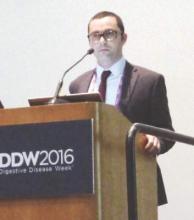SAN DIEGO – Diabetes (not recent onset), obesity, and gallstone disease were associated with the occurrence of sporadic pancreatic neuroendocrine tumors (PNET) in the prospective, case-control European EpiNet study.
Cigarette smoking, first-degree family history of cancer, and alcohol consumption were not significantly associated with PNET in this study, which was reported at the annual Digestive Disease Week.
“This is the first prospective multicenter study investigating risk factors for the occurrence of PNET. We confirmed that diabetes, obesity and gallstone disease are significantly associated with PNET. The role of obesity is confirmed for the first time. However, the study failed to confirm an association with family history of cancer, smoking cigarettes, alcohol consumption, hormonal reproductive factors, or allergies. This is different from pancreatic cancer,” said lead author Dr. Roberto Valente, Sapienza University of Rome, Italy.
PNET is a rare tumor, comprising 1% of all pancreatic tumors and 10% of all pancreatic neoplasms.
“The incidence of PNET is rising over time and we don’t know why. Thus far, risk factors for PNET have been poorly investigated. Many factors associated with pancreatic cancer have not been previously studied in PNET, including allergies, use of aspirin, and reproductive/gynecologic factors in women,” he said.
Previous case-control studies in small samples identified diabetes, smoking, alcohol consumption, and a family history of cancer as potential risk factors. Dr. Valente and coinvestigators sought to evaluate risk and protective factors for PNET in a more rigorous study.
Participants were drawn from five European countries. The study included 201 cases of sporadic, histologically proven PNET diagnosed within 24 months of the initiation of the study, and 603 controls matched for age and sex. For both cases and controls, about 50% were male, mean age was 59 years, and 97% were Caucasian. Among cases, 76.6% had nonfunctioning PNET that were equally distributed anatomically.
Participants responded to standardized questionnaires about demographics, and environmental, and familial risk factors using a predefined standard questionnaire.
Obesity (defined as body mass index [BMI] greater than 30) was significantly more prevalent in cases than controls (26.5% versus 19.26%, respectively, P = .03). Diabetes was also significantly more prevalent in cases than controls (18.5% versus 12.5%, respectively P = .003).
No differences were found between cases and controls in family history of any cancer, alcohol consumption, coffee drinking, or cigarette smoking.
Looking at previous medical history, only gallstone disease was strongly associated with PNET, but this was of borderline statistical significance (19.2% versus 13.2%, respectively, P = .06).
The investigators looked at previously uninvestigated potentially protective factors such as allergies (asthma, eczema, hay fever), and use of aspirin. None of these was significantly more prevalent in cases compared with controls.
Reproductive/hormonal factors were analyzed in 98 cases and 294 controls. None of these factors was significantly different in cases or controls.
Univariate regression analysis adjusted for age found that diabetes (P = .02), diabetes for more than 1 year (P = .002), obesity (P = .02), and previous gallstone disease (P = .04) were significant risk factors for PNET.
Multivariate logistic regression analysis confirmed diabetes as a significant risk factor (P = .009), and obesity and gallstone disease were of borderline significance (P = .09 and P = .07, respectively).
“The reported risk factors partially overlap with those reported for pancreatic adenocarcinoma, thus suggesting a possible organ-specific carcinogenic effect,” Dr Valente noted.


